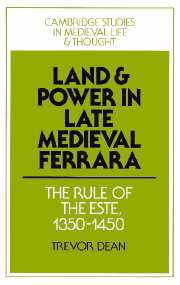Book contents
- Frontmatter
- Contents
- List of maps
- Preface
- List of abbreviations
- Note on sources
- Note on money, measurements and terms
- 1 Introduction
- 2 The Este patrimony
- 3 The Este vassals and their fiefs
- 4 Feudal tenure at Ferrara
- 5 Noble society at the centre
- 6 Noble society in the provinces
- Conclusion
- Appendices
- Bibliography
- Index
4 - Feudal tenure at Ferrara
Published online by Cambridge University Press: 10 November 2009
- Frontmatter
- Contents
- List of maps
- Preface
- List of abbreviations
- Note on sources
- Note on money, measurements and terms
- 1 Introduction
- 2 The Este patrimony
- 3 The Este vassals and their fiefs
- 4 Feudal tenure at Ferrara
- 5 Noble society at the centre
- 6 Noble society in the provinces
- Conclusion
- Appendices
- Bibliography
- Index
Summary
WHAT IS A FIEF?
This is the question with which feudal lawyers usually began their treatises on fiefs. The answer provided by one of them (Hugolinus) and copied by another (Baldus) may serve as our starting point. ‘A fief is a benefice (beneficium), which, by the goodwill of one man is granted to another in such a way that the ownership of some immovable property remains with the grantor, while the usufruct passes to the recipient and belongs to him and his male heirs (and female heirs if they are specifically mentioned) in perpetuity, with the intention that he and his heirs should faithfully serve the lord, whether that service is specified by the lord or is only indeterminately promised’. This definition centres on three points: the distinction between ownership (directum dominium in legal terminology) and usufruct or possession (utile dominium); the limitation to male heirs; and the requirement of service. These three elements are sufficient to explain many of the peculiar characteristics of feudal law. The distinction between ownership and possession meant that the lord had continuing rights in the property which the vassal had to respect: ‘the utile dominium is not free’, as Baldus explained, ‘but subject to servitude and loyalty to the lord’. In other words, the lord's ‘goodwill’, his acceptance of the vassal, had to be retained.
- Type
- Chapter
- Information
- Land and Power in Late Medieval FerraraThe Rule of the Este, 1350-1450, pp. 109 - 133Publisher: Cambridge University PressPrint publication year: 1987



